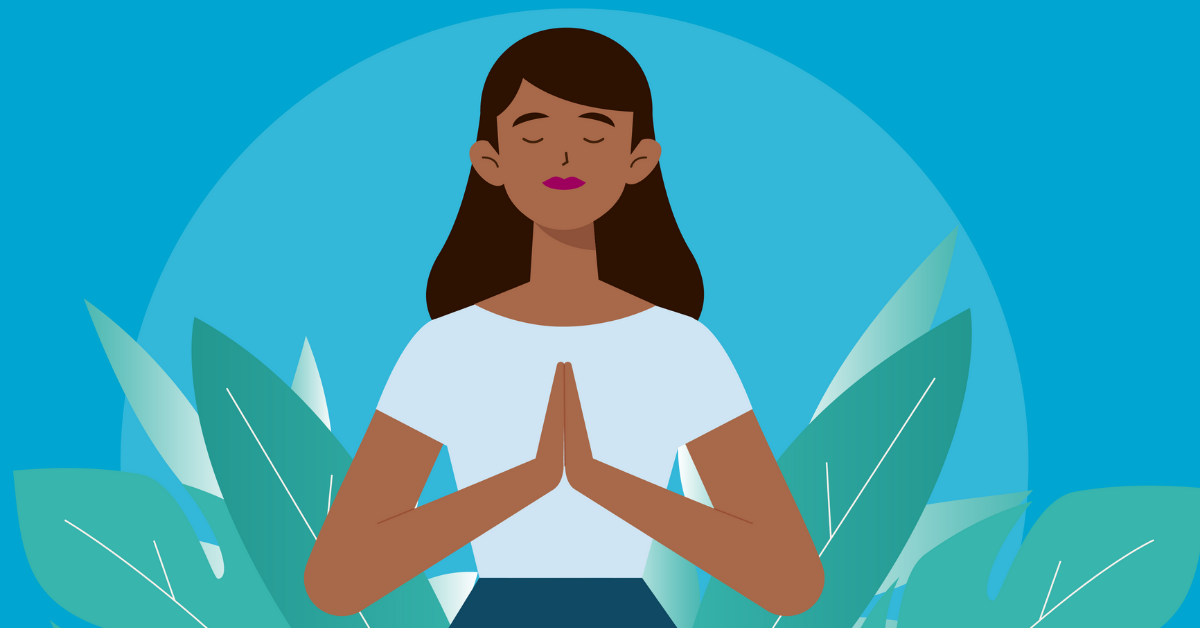
The practice of meditation has become synonymous with self-care. It is regularly pitched as an antidote to depression, stress and many mental health issues and can be just as quickly disregarded as a “band aid approach” to looking after one’s wellbeing. And while it’s understandable that some may dismiss it as a ‘catch-all’ solution, the amazing thing about meditation is that its benefits are not generally overstated and regular practice can have a profound impact on our mental health and overall wellbeing.
What is meditation?
So let’s start with the basics and explore what meditation actually is and what it involves. Meditation is a practice in which a person aims to focus their attention and slow down or stop racing thoughts to achieve emotional calmness and mental clarity. It is considered a type of mind-body complementary medicine and can produce a deep state of relaxation and a tranquil mind (Mayo Clinic, 2020). Many people think it’s about completely clearing the mind of all thought but it’s more about bringing non-judgmental awareness to one’s present state.
Meditation has been practiced for thousands of years and has its roots in various religious traditions. While meditation is still firmly connected to spirituality, many people now practice it independently of any religious beliefs.
There are many different types of meditation including mantra meditation, guided imagery meditation, Transcendental Meditation, and mindfulness which is probably the most widely recognised.
Meditation practices generally involve deep breathing, focused attention, noticing sensations in the body, and sitting or lying in a comfortable position. There is often a set amount of time for the practice and it is usually done in a quiet space, though not always.
Impact of meditation
You may have heard that meditation can change your brain and that is absolutely true! A lot of research has been done in this area. There are a number of well–regarded studies which have shown moderate benefits for patients presenting with depression, chronic pain, and anxiety who engage in mindfulness meditation programmes, even having effects similar to other existing treatments including medication and talk therapies. As with all forms of intervention, there is no one-size-fits-all solution to these presentations, but mindfulness programmes were seen to be as good as other treatments for some patients (Powell, 2018). Though less well researched, there is also some evidence to suggest that meditation can help people with addiction recovery as well as a number of physiological ailments such as high blood pressure and irritable bowel syndrome.
Scientists have viewed the brain after meditation using fMRI scans and have noted that our brains stop processing information as actively as they normally would. Harvard neuroscientist, Sara Lazar, states that four regions of the brain associated with healthy brain function become more substantial after meditation. These areas of the brain are responsible for empathy, memory and compassion. Similarly, the brain cell volume in the amygdala actually shrinks in size. This is the part of the brain responsible for anxiety, stress and fear (MindWorks).
How these changes can benefit us all
These changes in the brain can enhance our overall wellbeing. The knock-on effect of this means that meditating can have a huge benefit in many aspects of our everyday life. Meditation can;
1. Help with stress management
2. Bring our focus into the present
3. Increase self-awareness
4. Strengthen emotional connection to physical sensations and pain in the body
5. Increase patience and tolerance, reducing feelings of judgement
6. Enhance creativity
7. Building regular practice
Now that we know just how beneficial meditation can be, the next step is to try incorporating a daily practice into our routine.
It’s usually recommended to start slowly, perhaps trying for even just 5 minutes per day. This can be gradually increased over time. Find a comfortable seat or space in your home you can dedicate to your meditation practice and get to know what position feels most comfortable to sit or lie in for your practice. If possible, try to meditate at the same time each day. This may help with establishing a routine which recent research shows takes longer than 21 days as previously considered, so try to be patient with yourself!
Use a dedicated meditation app, or find a video online to follow. Not all meditations require following a spoken guided practice- some use chanting or many people meditate in silence. This is generally for more experienced practitioners, though, so if you are a complete novice, using an app or video may be a good idea. Try out different styles of practices. There are so many to choose from; body scans, visualisations, progressive relaxations, mantras and many more…
Approach each practice with compassion and without judgement. It can take time to get used to meditating and the journey into it can be as important as the practice itself.
Meditation is just one way to enhance and support your overall wellbeing. Zevo Health offer a broad range of services, including our mindfulness workshop that are designed to boost ad enhance the wellbeing of organisations.
Mayo Clinic Staff (2020) Meditation: A simple, fast way to reduce stress URL
Mindworks Staff. How meditation changes the brain URL
Powell, A. (2018) When science meets mindfulness. Harvard Gazette URL


